The Dell XPS 13 (9300) Review: Return of the King
by Brett Howse on July 16, 2020 10:00 AM ESTBattery Life
One area that the XPS line has historically done very well was in battery life. This has been a combination of Dell building very efficient devices, as well as providing above-average battery capacities. For the 2020 XPS 13, Dell is offering a 52 Wh battery, which is somewhat smaller than they have in previous models. We shall see what kind of an impact that has on the overall runtime of this notebook. To fairly compare models, all devices are tested with the display brightness set to 200 nits.
Web Battery Life
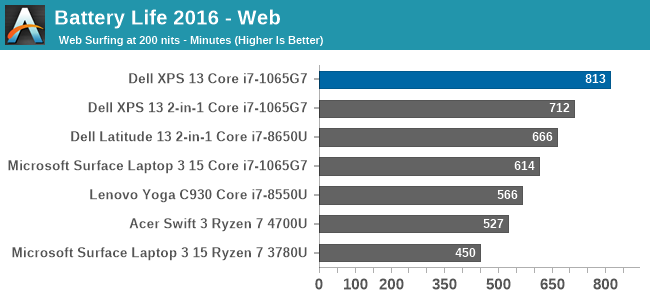
Dell starts out strong with an excellent result on our web battery life test. It managed to achieve over 13.5 hours of runtime on this fairly demanding web workload.
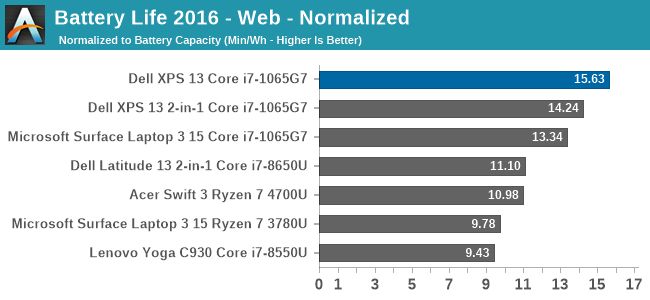
The normalized result removes the battery size from the equation so we can get a clearer picture on overall device efficiency, and we can see why the XPS 13 has lost none of its amazing battery life despite Dell shrinking the battery capacity. Dell continues to lead the field here, at least with the 1920x1200 display that we reviewed. Certainly the higher-resolution, wide-gamut 3840x2400 panel would impact this result significantly.
PCMark 10 Modern Office Battery
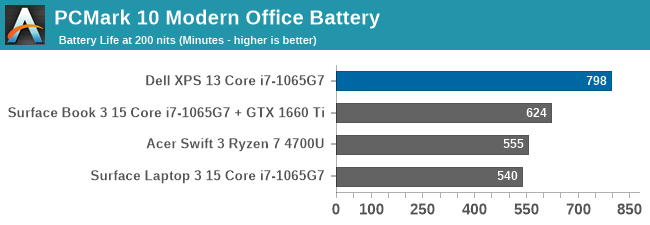
A new benchmark added to the stable is the PCMark 10 Modern Office Battery test, which runs through several common office scenarios on a ten-minute loop. If a device is able to finish the tasks quicker, it gets to idle for a higher percentage of the ten-minute test loop, so efficiency is important, but performance also plays a factor. The XPS 13 once again achieved a very strong result, almost matching the web runtime.
Movie Playback
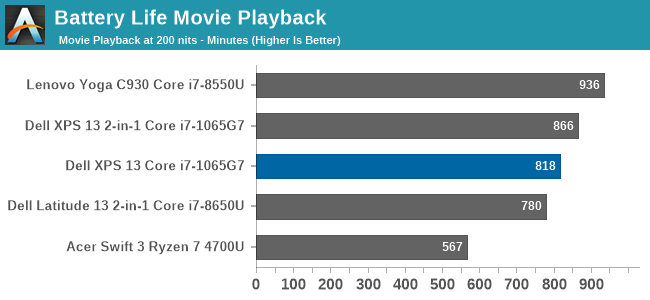
On the movie playback we generally see devices offer even more battery life than the other tests, but the XPS 13 showed such platform efficiency in the previous results that it was not able to extend that much here, but it is still a very strong result.
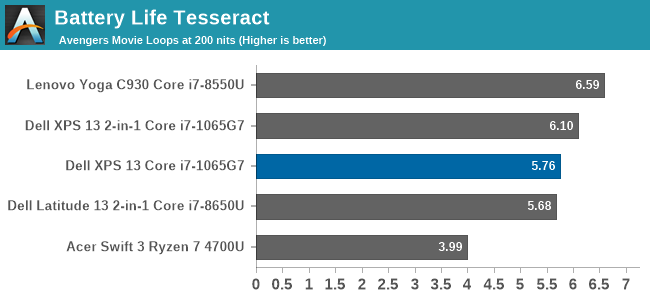
Breaking the movie playback into number of times you can play a very long movie, the XPS 13 almost achieves six complete playbacks of The Avengers before shutting down.
Charge Time
Dell ships a 45-Watt AC adapter with the XPS 13, which charges over a USB-C connector. Since there are Thunderbolt 3 ports on both sides of the notebook, it allows you to charge from whatever side is most convenient, which can help with cable management and is always a nice bonus.
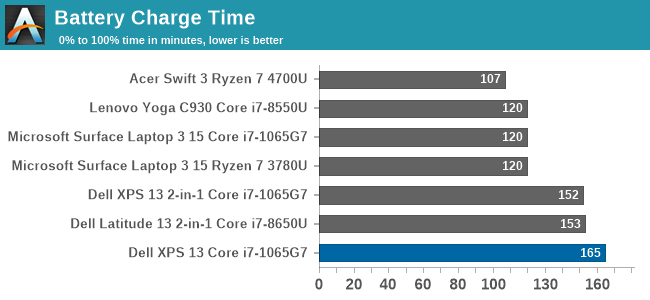
The small charger is plenty to run the notebook, but the charge rate is not spectacular. Luckily, the excellent battery life does mitigate this. Dell does offer an ExpressCharge option which will charge the battery to 80% in one hour and fully charge in two hours, however the user has to specifically choose this if they desire it using the Dell Power Manager software.










224 Comments
View All Comments
Jorgp2 - Thursday, July 16, 2020 - link
>Zen 2 mobile chips easily outperform Ice Lake and Comet LakeOnly in multicore, and only because they have 8 cores.
The Zen 2 architecture still has around Skylake level performance, SNC and WLC have a much higher lead over Skylake than Zen 2 does.
rhysiam - Thursday, July 16, 2020 - link
On what basis are you announcing Sunny Cove and the unreleased Willow Cove as superior architectures? Can you link to some data to support that? Because this review directly contradicts that claim.The lightly threaded tests in this very review show the 4700U trading blows with the 1065G7. Both are clocked similarly. IPC is close in workloads that are relevant to ultrabooks.
I just can't see any basis for the claims you are making here.
Deicidium369 - Friday, July 17, 2020 - link
Comparing a 2020 CPU with a 2019 CPU is not a fair comparison.sorten - Thursday, July 16, 2020 - link
Most of what I do as a software engineer, from the compilers, build tools, and the software I write, eats up the cores. So if I can get 2x the cores for less money, then that's a bonus rather than a point against AMD.vladx - Friday, July 17, 2020 - link
As a fellow software engineer, I still prefer Intel over AMD. What you win with having more cores, you lose with poor compiler optimizations and the big advantage of AVX-512 in certain workloads. Not to mention AMD platforms tend to have more bugs at launch so you spend more time finding workarounds.Spunjji - Friday, July 17, 2020 - link
@vladx with the FUD here. Nice weasel words with "tend to have more bugs" even though we're talking about a specific platform that doesn't have any egregious bugs.Santoval - Friday, July 17, 2020 - link
"and the big advantage of AVX-512 in certain workloads. "Can you name some of these workloads? Even better, out of 10 workloads (or, to make it temporal, out of every "10 programming hours") on average how many can benefit by or be accelerated with AVX-512? Hand on heart answers only please.
As for the "poor compiler optimizations" do you mean the "super aggressive compiler flags Intel tends to prefer that often result in poorer, bug prone code"?
Spunjji below covered me with the arbitrary "bugs" of the "AMD platforms".
Santoval - Friday, July 17, 2020 - link
"The Zen 2 architecture still has around Skylake level performance, SNC and WLC have a much higher lead over Skylake than Zen 2 does."That is pure, groundless BS. You have also confused the Zen 2 "architecture" (thus only the *IPC* of Zen 2) with Skylake's "performance" (both its IPC and clock speed). That is like comparing the acceleration from 0 to 60/100 of one car with the final speed of another car without even realizing the arbitrary comparison.
Finally CPUs with Willow Cove (i.e. Tiger Lake) has not even been released yet, so referring to Willow Cove in the present tense is beyond surreal.
dudedud - Friday, July 17, 2020 - link
Did you even see the Cinebench single threaded results? Zen 2 has Ice Lake performance at around the same clock (4.1 vs 3.9)Brett Howse - Friday, July 17, 2020 - link
There seems to be a lot of misinformation flying around here. Perhaps I should link to our initial Ryzen 7 4700U review in every review I do. Ice Lake is well ahead in single-threaded performance over Zen 2, despite the lower frequency. AMD has double the cores though so even lightly threaded workloads can see a nice improvement.Please reference this:
https://www.anandtech.com/show/15762/the-acer-swif...
Cinebench is just a single workload and is compute bound.
Hopefully we can update our SPEC results with a LPDDR4 laptop as well since our first take was just DDR4.